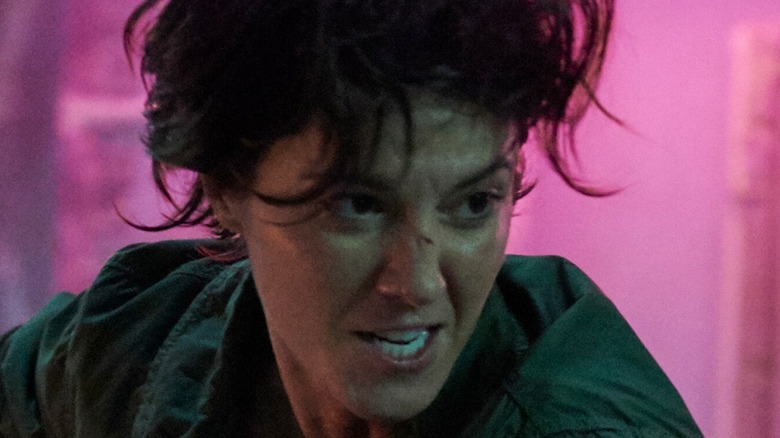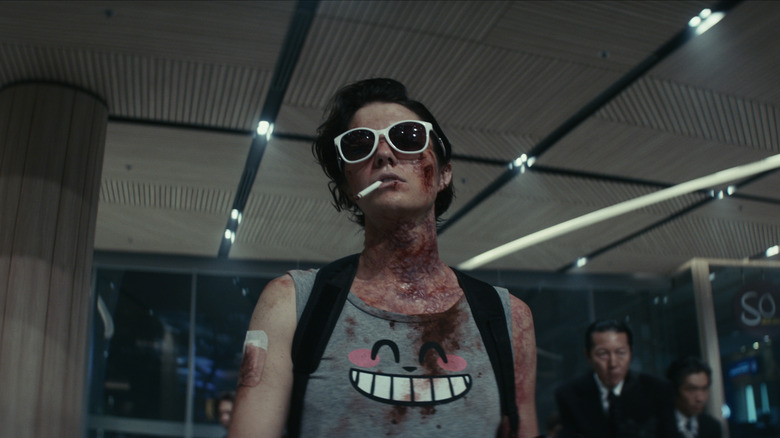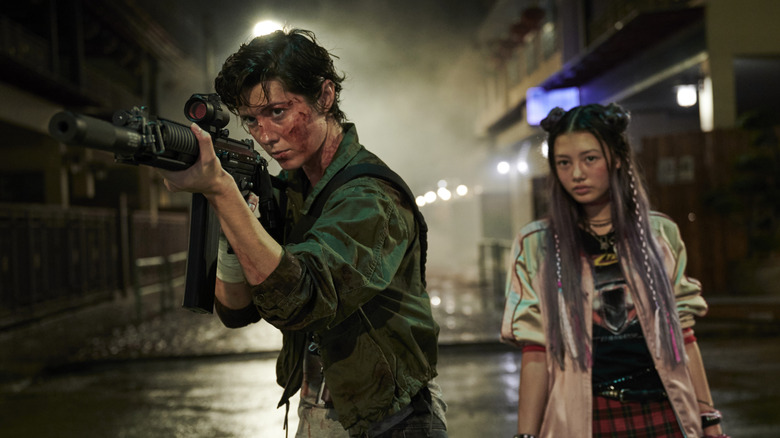Kate Review: 24 Hours To Kill
The post-"John Wick" landscape of action cinema has given us an ever-expanding new crop of slick, neon-drenched, intimate character thrillers, and at this point it's fair to ask how much more this particular subgenre boom has left to give us. We see trailers for films like "Kate," the new Netflix original revenge film that follows the title character as she spends her final hours hunting down those who wronged her, and we wonder how predictable the narrative will be, how many action beats will feel ripped from other films we've already seen, how much yet another film that looks and feels like this can possibly contribute to action movies as they've unfolded over the course of the last half-decade or so.
If you're an action movie junkie, it's natural to think these things at first glance, but "Kate" is a film that reminds you that these thoughts don't really matter much when you're in the right hands. Anchored in Mary Elizabeth Winstead's searing title performance and packed with visual style to spare, "Kate" is a film that wears its influences firmly on its sleeve but never lets those influences dictate where its heart should go, and that makes it both compelling and, in its way, soulful.
Visual style to spare
Winstead's Kate is an assassin — and a very good one, trained from childhood by her handler, Varrick (Woody Harrelson), to have ice water in her veins and never miss a target. As she gets older, though, Kate's thinking it might be time to get out of the hired killer game and see what else is out there, and she's on the verge of making that freedom happen. Then, just before what's supposed to be her final job in Tokyo, someone slips her a deadly dose of radiation poisoning. With hours to live, Kate sets out to find the people who poisoned her and settle every score she can before the poison claims her.
This is the catalyst for Kate's bloody revenge journey, but perhaps somewhat surprisingly it's not the only engine pushing the plot forward. The honor falls to Ani (Miku Martineau), a teenage girl with family ties to Kate's targets, who forms an unlikely bond with the dying assassin on her road to revenge. Writer Umair Aleem wisely adds Ani as someone for Kate to talk to on her road to doom, then pushes that dynamic further than their early encounters might suggest. That this relationship exists at all is a boon to "Kate." That Aleem has the presence of mind to show us how it evolves is one of the film's greatest assets.
Then there's director Cedric Nicolas-Troyan, who heaps visual charm on the film in fight sequences, Tokyo dance clubs, and everything in between. Nicolas-Troyan began his career in visual effects, and it shows, as "Kate" dazzles with hot pink-laced car chase sequences and fights staged in Tokyo dining rooms painted black and white to look like a backdrop from a Kurosawa samurai film or the climactic fight from "Kill Bill Vol. 1." As the film moves at breakneck speed from street fights near Tokyo food stalls to showdowns in glass high-rises, Nicolas-Troyan pulls from a tremendous grab bag of influences — you can see everything from "Blade Runner" to "Speed Racer" to any number of anime films in his compositions — but he never loses focus on the film's true center: The title character, and Winstead's knockout portrayal of her.
Winstead commands the screen
The first thing we learn about Kate, even before the central engine of "Kate" starts to really churn, is that she wants a life beyond the deathbringing profession she's been wrapped up in for the entirety of her adulthood. It's a simple motivation, one we've seen in countless films about assassins, but the great success of the film is Winstead's ability to lend this feeling credence, grace, and vulnerability, even when the guns start blazing.
If "Kate" has a central flaw, it's that nothing about its overall plot feels especially surprising or new. It's not a novel complaint, but it feels true through fight scene after fight scene, even when the film makes an effort to throw in a twist or two. What we often want most from an action film is that sense of jaw-on-the-floor surprise, even if it's momentary, and while "Kate" is able to tiptoe up to that with its plot every now and then, it never quite crosses that threshold. Despite its stylishness, it feels, at times, a little paint-by-numbers.
I mention all that in part to acknowledge the film's shortcomings, but more importantly to note that, because of Winstead, none of that really matters with "Kate." Her performance is so dialed in, so crackling with intensity and exhaustion and all the other things this character in this situation is called to feel, that even when you see the next plot development coming well before it's rounded the corner, you're paying more attention to her than to the story you think you might have seen before. Early on in the film, I found myself wondering exactly why — other than the obvious stylistic appeal — the film was set in Tokyo when it follows a non-Japanese character, and then Winstead's performance made it plain. Kate could be in Tokyo or Vancouver or Dallas, and she'd still feel like an alien, a stranger removed from the wider world by the profession that's defined her life. Winstead's able to play that alienation, that sense of distance, without ever sacrificing Kate's central humanity. It's a stunner of a performance, and one that pushes the film from watchable to gripping. Throw in Martineau's boundless energy as an occasionally quipping, occasionally cursing, always engaging companion, and it all works.
Thanks to Winstead, her chemistry with Martineau, and Nicolas-Troyan's wisdom in never losing sight of the film's core heart, "Kate" rises above the background noise of countless streaming options to become something worth paying attention to. In a career that's covered everything from "Scott Pilgrim vs. The World" to "Fargo," she's proven her mettle as an actor, and thanks to her determined work, this film becomes the showcase she deserves.
"Kate" arrives September 10 on Netflix.


